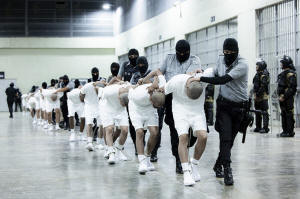Trump administration invokes state secrets privilege in case over
deportations under wartime law
[March 25, 2025]
By MICHAEL KUNZELMAN and LINDSAY WHITEHURST
WASHINGTON (AP) — The Trump administration on Monday invoked a “state
secrets privilege” and refused to give a federal judge any additional
information about the deportation of Venezuelan migrants to El Salvador
under an 18th century wartime law — a case that has become a flashpoint
amid escalating tension with the federal courts.
The declaration comes as U.S. District Judge James Boasberg weighs
whether the government defied his order to turn around planes carrying
migrants after he blocked deportations of people alleged to be gang
members without due process.
Boasberg, the chief judge of the federal district court in Washington,
has asked for details about when the planes landed and who was on board,
information that the Trump administration asserts would harm “diplomatic
and national security concerns."
Government attorneys also asked an appeals court on Monday to lift
Boasberg's order and allow deportations to continue, a push that
appeared to divide the judges.
Circuit Court Judge Patricia Millett said Nazis detained in the U.S.
during World World II received better legal treatment than Venezuelan
immigrants who were were deported to El Salvador this month under the
same statute.
“We certainly dispute the Nazi analogy,” Justice Department attorney
Drew Ensign responded during a hearing of the U.S. Court of Appeals for
the District of Columbia Circuit.
Millett is one of three appellate judges who will decide whether to lift
a March 15 order temporarily prohibiting deportations under the Alien
Enemies Act of 1798. They didn't rule from the bench Monday.

A second judge appeared open to the administration’s argument that the
migrants should be challenging their detention in Texas rather than the
nation’s capital. The third judge on the panel didn’t ask any questions.
The administration has transferred hundreds of Venezuelan immigrants to
El Salvador, invoking the Alien Enemies Act for the first time since
World War II.
Also on Monday, attorneys representing the Venezuelan government filed a
legal action in El Salvador to free 238 Venezuelans who are being held
in a Salvadoran maximum-security prison after the U.S. deported them.
President Donald Trump's administration appealed after Boasberg blocked
those deportations and ordered planeloads of Venezuelan immigrants to
return to the U.S. That did not happen.
The Alien Enemies Act allows noncitizens to be deported without the
opportunity to go before an immigration or federal court judge. Trump
issued a proclamation calling the Tren de Aragua gang an invading force.
Ensign argued that Boasberg’s ruling was an “unprecedented and enormous
intrusion upon the powers of the executive branch.”
“The president has to comply with the Constitution and the laws like
anyone else,” said MiIlett, who was nominated by Democratic President
Barack Obama in 2013.
[to top of second column]
|

In this photo provided by El Salvador's presidential press office,
prison guards transfer deportees from the U.S., alleged to be
Venezuelan gang members, to the Terrorism Confinement Center in
Tecoluca, El Salvador, Sunday, March 16, 2025. (El Salvador
presidential press office via AP)

Judge Justin Walker, whom Trump nominated in 2020, seemed to be more
receptive to the administration’s arguments based on his line of
questioning. Walker pointed to the government’s arguments that the
plaintiffs should have filed their lawsuit in Texas, where the
immigrants were detained.
“You could have filed the exact same complaint you filed here in
Texas district court,” Walker told American Civil Liberties Union
attorney Lee Gelernt.
“We have no idea if everyone is in Texas,” Gelernt said.
Walker also pressed the plaintiffs’ lawyer to cite any prior case in
which a judicial order blocking “a national security operation with
foreign implications” survived appellate review.
Gelernt accused the administration of trying to use the law to
“short circuit” immigration proceedings. Plaintiffs’ attorneys had
no way to individually challenge all the deportations before
planeloads of Venezuelans took off on March 15, he added.
“This has all been done in secret,” Gelernt said.
Judge Karen LeCraft Henderson, who was nominated by Republican
President George H.W. Bush in 1990, was the third judge on the
panel. She didn’t ask any questions during a hearing that lasted
roughly two hours.
Boasberg, an Obama nominee, ruled that immigrants facing deportation
must get an opportunity to challenge their designations as alleged
gang members. He said there is “a strong public interest in
preventing the mistaken deportation of people based on categories
they have no right to challenge.”
“The public also has a significant stake in the Government’s
compliance with the law,” the judge wrote.
Trump and his allies have called for impeaching Boasberg. In a rare
statement, Supreme Court Chief Justice John Roberts said
“impeachment is not an appropriate response to disagreement
concerning a judicial decision.”
Just after midnight Monday, Trump posted a social media message
questioning Boasberg's impartiality and calling for him to be
disbarred.
During a hearing Friday, Boasberg vowed to determine whether the
government defied his oral order from the bench to turn planes
around. The Justice Department has said that the judge’s oral
directions did not count, that only his written order needed to be
followed and that it couldn’t apply to flights that had already left
the U.S.
All contents © copyright 2025 Associated Press. All rights reserved
 |